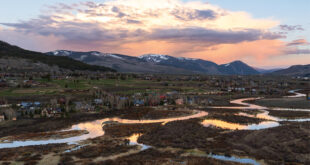Despite the claims of some people, the short-term rental situation is not a slam-dunk on any side of the issue. Some thoughts as the Crested Butte Town Council prepares to focus in on a new rule set governing short-term rentals in town:
Banning short-term rentals probably isn’t going to create a new glut of long-term affordable housing for the lift ops or dishwashers in town. Long-term renting comes with its own set of issues and I know more than one person who has gotten burned by people here for a season or the long run who trash a place. Nothing is easy.
As people spend a lot of money on homes in town and then spend more money to make them nice, we lose the old, cheap mining houses that so many of us were able to rent. Wealthier people who apparently don’t need long-term rental income and the hassles that come with being a landlord own the renovated homes. So instead of renting to five dudes fresh out of college and looking for a ski town adventure (a.k.a. party!), it seems most will choose to use the homes as second homes or places for friends and family.
And as opposed to filling them with sales-tax-generating short-termers, if VRBOs are banned, they might sit empty and dark much of the time. I’m not sure which option is better.
Now, short-term rentals definitely have an impact on a neighborhood. Instead of a reliable neighbor across the street that will lend you a cup of (organic) sugar when needed, you have a hotel guest with no tie to the depth of the neighborhood. That is not a good long-term impact. It makes it overall less personal and somehow just feels like it hollows out the neighborhood. When the hotel guests using your neighborhood intentionally or unintentionally break the mores of a neighborhood, it puts stress on everyone. A late night party on a school night, leaving the trash out for the bears or bringing in a new dog that tries to show its dominance all weaken the neighborhood bonds.
On the other hand, I know of several people who live here who use short-term rentals so they can continue to stay here. That’s right—short-term rentals help make it possible for some local families and workers who contribute to the community to stay in the increasingly expensive valley. They may have gotten lucky and gotten in early, but the ability to make some money from tourists in a tourist town to help pay the mortgage or buy groceries goes a long way for the Crested Butte middle class. So like most things in life, it is not a black-and-white issue.
The fact that the town of Crested Butte is making a real effort to address the short-term rental phenomenon before the start of 2017 is admirable. The relatively new business idea needs a rule set that addresses basics like who to call when things go bad. It also can address the larger philosophical issues about how to avoid turning the entire town into a boutique Marriott with a pullout couch.
There is one weirdly uncomfortable thing that popped up during this recent Crested Butte short-term rental discussion and I can’t not touch on it just because the optics are so poor. A couple of Crested Butte town councilmen rushed in last week to obtain a business license so they could potentially short-term rent their homes. The weirdness is not that Paul Merck and Roland Mason applied for a license so much as the timing. They did so during the course of or immediately after council and staff discussion on whether to implement a moratorium on further short-term rentals as an “emergency” ordinance. Such an ordinance would have enacted a moratorium immediately. They were both against such action but obviously wanted in before that possibly happened. The timing just sort of has a sour aroma to it. It certainly seems obvious or pretty coincidental that they were motivated by knowledge that the Security and Exchange Commission would probably hammer someone with over a stock deal.
Ultimately, the council is not asking for such an emergency ordinance but is headed toward a moratorium by the middle of this month. So they, like everyone else, have a chance to apply for the license and be “grandfathered in” before any rules change. To be clear, what Merck and Mason did is not illegal. Given the result of the council not pursuing an emergency ordinance, it might not even be considered unethical. But the motivation just doesn’t feel right and for those two guys, whom I really like, it is rather disappointing.
Right now five of the seven councilmembers (Merck, Mason, Vohman, Michel and Mitchell) have licenses that allow them to short-term rent their property. I think that’s fine. It might help these long-time locals be able to live here as stated above. But it also seems odd that they could potentially vote to limit any more such licenses in town. That would seem to make whatever licenses there already are, including theirs, more valuable. That’s another example of more weird optics.
If the council thinks short-term rentals are destroying the town I would think those with licenses on the council would rescind them. They haven’t. In fact, they’ve gone the other way.
It seems the clear message and advice is for home-owning residents of town to follow their leaders—get on the town’s website this week and get yourself a business license that allows you to short-term your place.
As Roland explained to me, “I applied to keep my financial options open.” That’s honestly sound advice for anyone trying to make it here.
In the meantime, let’s see what the town comes up with to deal with a relatively new issue that is certainly impacting communities across the world including here.
—Mark Reaman
 The Crested Butte News Serving the Gunnison Valley since 1999
The Crested Butte News Serving the Gunnison Valley since 1999





